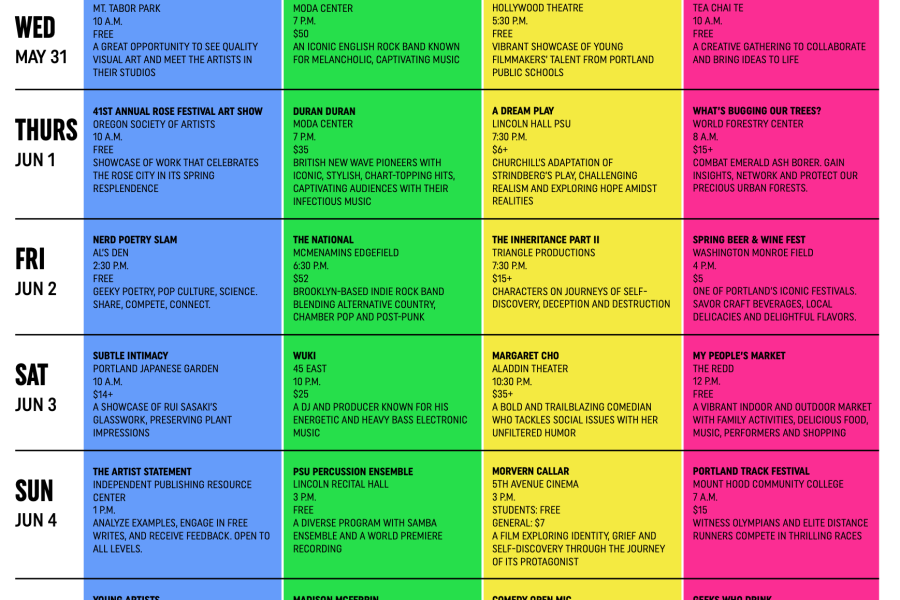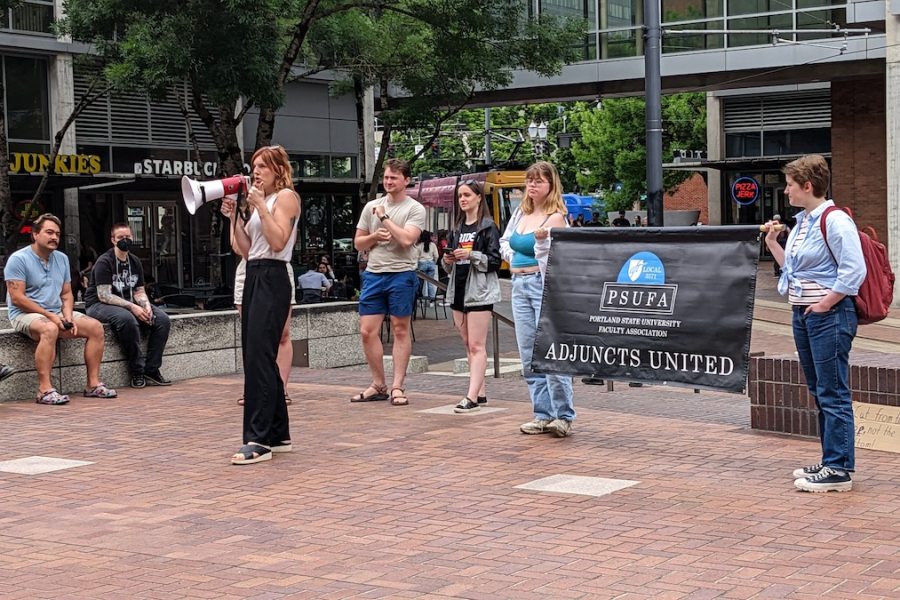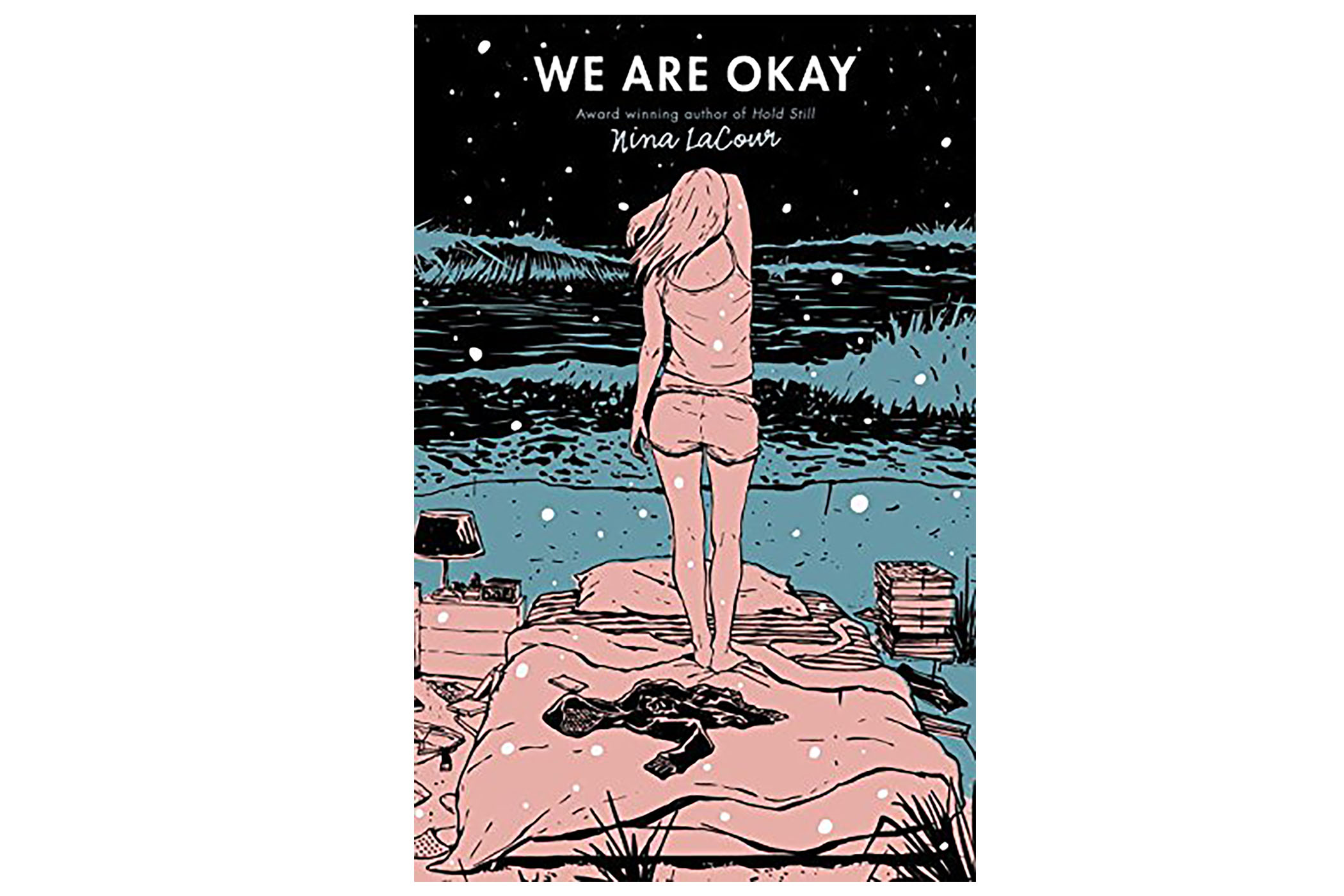During the first three weekends of June, in the wooded fairgrounds of Canby’s Clackamas County Event Center, hundreds of artists, merchants and performers will come together for the Oregon Renaissance Faire.
The faire is a creative experience for all ages, inspired by the culture of 16th century Scotland. Each weekend aligns with a particular renaissance theme, from fairytales to pirates to Celtic celebration.
Among the many musical performances, theatrical dramas and varied stunt artists will be
Samantha Rose Owings as the Mistress of Melody, Celtic harpist and singer; Knights of the Realm, competitive jousters and swordsmen; and Ignition Fire Troupe, a fire breathing, fire dancing martial arts group.
Merchant goods across wildly different specialties and mediums will be available, such as Celtic hair beads, ceramic mobiles, taxidermy jewelry and bejeweled flower crowns. As for food, all the best of typical faire fare meets Northwest European cuisine, with dishes like cornish pasties, crepes and pretzels.
Performers, organizers and attendees are all encouraged to dress for the occasion, may that be a whimsical cosplay or traditional Celtic attire. If you find your closet scarce of kilts or cloaks, not to worry—the ORF will host plenty of vendors selling renaissance-themed clothing and accessories.
Molly Whitaker, artist and owner of Mythica Metalworks, is one of them. Whitaker’s craft is chainmaille, an ancient art consisting of interlocking metallic rings to form a mesh, historically purposed as protective body armor. “You’re taking different sizes of circles and you’re weaving them together,” Whitaker explained. “Almost like you’re knitting with fabric or with fiber—but you’re knitting with metal.”
Whitaker fashions ornate jewelry, headpieces and cosplay accessories through chainmaille. “You can create all kinds of beautiful intricate shapes that way, and I incorporate gemstones and crystals and other things into my jewelry as well with the chainmaille techniques,” she said.
Whitaker is one of many creatives traveling from out of state to attend the Oregon Renaissance Faire. This event is a unique opportunity to support independent artists and small business owners who have devoted so much energy and time to develop their products and community platforms. “I make everything by hand,” Whitaker said. “I do all of it myself, every step of the way—design, fabrication—I do graphic design work and branding work and setup work… so it’s a lot of hard work, but it’s also really fun and rewarding to be the owner of a creative business.”
Additionally, cultural festivals offer an alternative to increasingly expensive physical storefronts. For many small businesses, maintaining a physical location is simply not sustainable, but ORF allows for a more accessible mode of traditional commerce.
“Since the pandemic, we dropped the store altogether,” J.T. Centonze, founder of Off Kilter Kilts, explained in reference to his previous storefront. “It wasn’t supporting itself. But the events are still really lucrative, and we’re still able to liberate the masses from the tyranny of pants.”
Off Kilter Kilts is another vendor taking part in this year’s Renaissance faire. “We like to say that ‘anywhere there’s outdoor drinking there’s kilts and anywhere there’s kilts there’s outdoor drinking,’” Centonze said.
Centonze pointed out that although the conception of the modern kilt did not actually come about until after the European Renaissance period, “people associate it [the kilt] with the Renaissance faire because it’s still a historical garment to a lot of people.”
It would seem that the garment is not truly obsolete though, as Off Kilter Kilts demonstrates the kilt’s renaissance of its own. “We have a growing community of people who are every day kilters,” Centonze said. “I haven’t worn a pair of pants in over a decade. I’ve converted a number of people to 7 / 365 kilting because it just makes way more sense.”
Off Kilter Kilts markets kilts, tartans, belts and accessories to people of all ages, genders and identities. “The modern version of the kilt is really open to the world,” Centonze explained. “We have a saying that ‘you don’t have to be Scottish to be comfortable.’”
So too is the Oregon Renaissance Faire an experience open to everyone. “Until you experience it, you’re not always sure, like would a Ren Faire be something that I would enjoy?” Whitaker said. “But I think it’s a lot more than what people realize.”
“The nice thing about the renaissance faires is that there is definitely an element of historical interest there…of this idea of a historical reenactment,” she said. “But they have evolved and developed into something that is just enthusiasm for a lot of traditional craftspeople and their work.”
Tickets for the Oregon Renaissance Faire are $25 for general admission, and free for kids under 13. Tickets are not sold at the door, and must be bought in advance.






